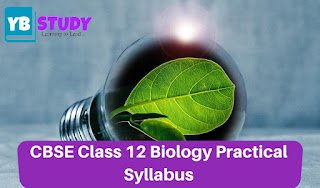CBSE Class 12 Biology Practical Syllabus 2026
Hello Students today in this article we are providing CBSE Class 12 Biology Practical Syllabus 2025 for Class 12 Biology Practical Examination 2025 or a list of Class 12 biology practicals is given here. In this article, you will get complete details related to the CBSE Class 12 Biology Syllabus i.e., How to perform its evaluation scheme, list of experiments in your CBSE Class 12 Biology Practical Syllabus, projects work how to write it, etc.
As we all know Class 12th percentage not only matters in life but is like the base of a student’s future. If you compare your life with a building then it is the base of that building, the more strong the base will be, the more stable will be the building. By scoring good marks in board practical exams as well as competitive exam like NEET you can achieve your dream.

If you are looking for the latest CBSE Class 12 Biology Practical Syllabus 2025 then you are at the right place At the end of this article, you will find useful tips for practical exams. These tips will help you to get maximum marks in the CBSE Class 12 Biology Practical exam 2025.
Read: CBSE Class 11 Biology Syllabus
Evaluation Scheme for CBSE Class 12 Biology Practical Exam
Evaluation Scheme
- One Major experiment = 05
- One Minor experiment = 04
- Slide Preparation = 05
- Spotting = 07
- Practical Record + Viva Voice = 04
- Project Record + Viva Voice = 05
- Total = 30 Marks
Read: NEET MCQ Class 11 & 12 Chapterwise
CBSE Class 12 Biology Practical Syllabus 2025
A. List of Experiments (60 Periods)
1. Prepare a temporary mount to observe pollen germination.
2. Collect and study soil from at least two different sites and study them for texture, moisture content, pH and water holding capacity. Correlate with the kinds of plants found in them.
3. Collect water from two different water bodies around you and study them for pH, clarity and presence of any living organism.
4. Study the presence of suspended particulate matter in air at two widely different sites.
5. Study the plant population density by quadrat method.
6. Study the plant population frequency by quadrat method.
7. Prepare a temporary mount of onion root tip to study mitosis.
8. Study the effect of different temperatures and three different pH on the activity of salivary amylase on starch.
9. Isolate DNA from available plant material such as spinach, green pea seeds, papaya, etc.
B. Study/observation of the following (Spotting)
1. Flowers adapted to pollination by different agencies (wind, insects, birds).
2. Pollen germination on stigma through a permanent slide or scanning electron micrograph.
3. Identification of stages of gamete development, i.e., T.S. of testis and T.S. of ovary through permanent slides (from grasshopper/mice).
4. Meiosis in onion bud cell or grasshopper testis through permanent slides.
5. T.S. of blastula through permanent slides (Mammalian).
6. Mendelian inheritance using seeds of different colour/sizes of any plant.
7. Prepared pedigree charts of any one of the genetic traits such as rolling of tongue, blood groups, ear lobes, widow’s peak and colourblindness.
8. Controlled pollination – emasculation, tagging and bagging.
9. Common disease causing organisms like Ascaris, Entamoeba, Plasmodium, any fungus causing ringworm through permanent slides, models or virtual images. Comment on symptoms of diseases that they cause.
10.Two plants and two animals (models/virtual images) found in xeric conditions. Comment
upon their morphological adaptations.
11.Two plants and two animals (models/virtual images) found in aquatic conditions. Comment upon their morphological adaptations.
Practical examination pattern varies a bit subjectwise and a lot also depend upon the External invigilator ( Generally They are good and cooperative in nature). Subjectwise here are some of the important points that can give you an edge. Do keep in mind that practicals have to be dealt with you and the external examiner. Both of you don’t know each other but by going through the CBSE Class 12 Biology Practical Syllabus will definitely help you.
Tips for Viva
- Understand the concepts instead of rote memorization.
- Try to perform all practical experiments on your own.
- Cultivate a genuine interest in the subject by practicing regularly. Passion breeds success.
- Show respect to the examiner during the examination.
- Stay relaxed and composed. Tension can affect your performance negatively.
- Maintain your confidence throughout the examination. Avoid showing fear or nervousness.
- Leave a positive impression by demonstrating your confidence.
- Maintain eye contact with the examiner.
- Give your full attention to the examiner’s questions.
- If you’re unsure of an answer, remain calm and wait for the examiner to provide guidance.
CBSE Class 12 Board practicals are very important. Getting full marks in practicals is very important but the dedication you need to give for them should be limited. The preparation for practicals should not affect your board marks. In most of the institutions the teachers try to give full marks to the students.
We are not saying you take board practicals lightly but learning how, why, to do the experiments is sufficient for the practicals. For learning you can learn with ybstudy from the net and memorise the formulas of them and even if you forget anything your teachers are always there to help you. So approach the exam with a cool mind. You can ace it very easily. All the best for your boards.
